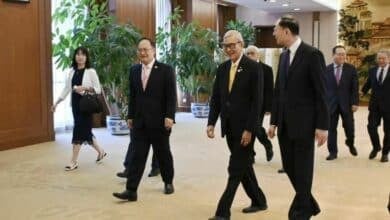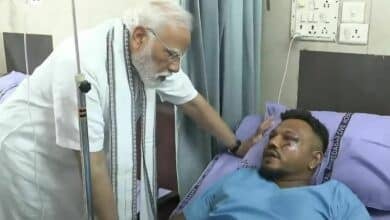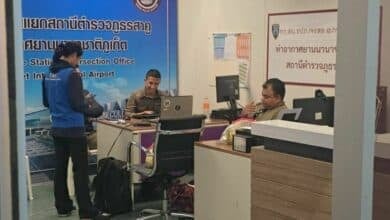World News
World news, global politics, business, technology, and culture—stay updated with breaking stories, international trends, and major events. Get the latest from The Thaiger, your trusted source for global news.
-
 Sponsored
Sponsored Where to travel in Thailand in July [2025]
This month, I want to invite you to wander through art spaces, misty hills, and garden paths, where the only thing on the itinerary is to linger. Let’s take a slower route, one for the dreamers, the journal keepers, and...
-

Norse Atlantic soars with new Thailand routes, slashes US services
Norse Atlantic Airways is ramping up its winter schedule, adding four exciting new routes connecting Europe with Thailand as part of its ongoing expansion into Southeast Asia. Set to launch in October and December, these new flights are designed to tap into the surging demand for travel to Thailand, one of the top destinations for European leisure travellers. The carrier…
-

Pattaya targets Japan: Roadshow in Osaka aims to boost tourism
Pattaya is setting its sights on Japan as a prime tourist market. The city recently hosted the Pattaya Variety Roadshow to Japan 2025 in Osaka, aiming to boost its appeal and showcase its attractions to Japanese travellers. Led by Thitiphan Petchtrakul, Deputy Mayor of Pattaya, the event aimed to showcase the city’s tourism offerings and expand its appeal to the…
-

Taxi horror: Thai tourist harassed by cab driver in South Korea
A South Korean taxi driver sparked outrage online after harassing a female tourist from Thailand with inappropriate comments during a ride. The incident, which has since gone viral, has drawn anger from both Thai and South Korean netizens, calling for justice and better protections for women. On June 19, a woman posted a disturbing video on social media, capturing her…
-

Bangkok Airways takes off with green fuel to slash carbon emissions
Bangkok Airways Public Company Limited is propelling its Low Carbon Skies by Bangkok Airways initiative with a major commitment to reducing carbon dioxide emissions. Starting today, July 1, the airline will officially introduce Sustainable Aviation Fuel (SAF) on its commercial flights, marking a significant step towards a more environmentally friendly future for aviation in Thailand. Captain Puttipong Prasarttong-Osoth, President of Bangkok…
-

India’s growth to boost Southeast Asia’s aviation market
India’s significant economic expansion is anticipated to bolster Southeast Asia’s aviation market, including Thailand’s aviation sector, as noted by the Indian airline IndiGo, which intends to introduce its new business class seating to Bangkok and Phuket. IndiGo Chief Executive Pieter Elbers highlighted that whenever new Southeast Asian destinations are launched or route capacities increased, there is a notable surge in…
-

Cambodia accused of mislabelling rice as Thai jasmine in China
Cambodia has been accused of falsely labelling its rice as Thai jasmine rice and selling it in China, prompting the Thai Ministry of Commerce to act swiftly. Yesterday, June 27, Sunanta Kangvalkulkij, director-general of the Department of International Trade Promotion, revealed that reports from Thai nationals in China indicated Cambodian rice was being sold in Chinese supermarkets with packaging displaying…
-

Thai Airways takes off for charity in Oslo celebration
Thai Airways stepped up to support a high-profile charity walk-run in Oslo, Norway, combining fitness, friendship, and fundraising in a celebration of diplomatic history. On Sunday, June 22, the streets of Oslo came alive as Thai Airways joined the Royal Thai Embassy in Oslo and the Faculty of Medicine Siriraj Hospital to mark 120 years of Thai-Norwegian relations with a…
-

Phuket airport tightens security, passengers urged to arrive early
Phuket airport is on high alert following the discovery of an explosive device hidden in an abandoned motorcycle on its premises. Passengers are urged to arrive at least two hours early from today, as security measures have been tightened in the aftermath of the threat. The warning comes after bomb experts successfully neutralised the device found on Wednesday night, June…
-

Woman caught smuggling exotic food from Thailand into Australia
In a daring attempt to smuggle over 62,000kg of exotic foods into Australia, a woman has landed herself behind bars after her plan to flood the Sydney black market with illegal goods was thwarted by vigilant border agents. The woman, who tried to import a variety of goods from Thailand, used mislabelled polystyrene boxes to ship the products. Inside, agents found a disturbing range of items,…
-

Bangkok Airways cancels flights to Lampang and Mae Hong Son
Bangkok Airways announced the temporary suspension of its flights between Suvarnabhumi International Airport and Lampang starting from October 26. This decision, which has left many passengers concerned, also affects the route between Bangkok and Mae Hong Son, which will be suspended from July 1. The airline revealed that the suspensions are due to fleet maintenance and commercial considerations, though it reassured passengers that alternative options would still be available. Despite the…
-

China and Thailand strengthen ties on 50th diplomatic anniversary
In a bold reaffirmation of its commitment to strengthening relations with Thailand, China’s Foreign Ministry has pledged to enhance cooperation on law enforcement and mutual growth. This comes as a nine-member Thai delegation, led by Tej Bunnag, Secretary General of the Thai Red Cross Society and former foreign minister, visits Beijing to mark the 50th anniversary of diplomatic ties between…
-

AirAsia celebrates 16 years of success with exclusive trip to Krabi
AirAsia is celebrating its 16th consecutive title as the World’s Best Low-Cost Airline, and they did it in style with a special trip to Krabi. In partnership with the Tourism Authority of Thailand (TAT), the airline hosted over 120 key opinion leaders (KOLs) and media representatives from across Asia, aiming to promote Green Season travel and showcase Krabi as a…
-

Phuket governor’s China trip boosts cancer care and green tech
Phuket Governor Sophon Suwanarat recently led a high-profile delegation to Guangdong province, China, on a fact-finding mission to explore cutting-edge cancer treatment, modern urban development, and green technology. The visit, which aimed at boosting Phuket’s public health services and advancing its vision of becoming a smart, low-carbon city, is set to provide invaluable insights for the island’s future. On Saturday,…
-

Krabi Airport soars as 5 airlines request landing slots
Krabi Airport is rapidly becoming one of Thailand’s most exciting aviation hubs, with five international airlines applying for landing slots. The surge in interest signals a growing global confidence in the airport’s capabilities and potential as a gateway to the Andaman region. Deputy Transport Minister Manaporn Charoensri revealed that the Department of Airports (DoA) participated in the 156th International Air…
-

Air India implements temporary flight reductions and safety measures
Following the tragic loss of passengers, crew members, and individuals on the ground in the AI171 incident on June 12, Air India has made several adjustments to its operations. The airline has expressed its deepest condolences and continued support for the families affected by this devastating event. Since the tragedy, the airline has been in constant communication with the relevant…
-

Global salad showdown: From papaya power to pickled crunch
Salads started simple with salt-soaked greens—now they’re global, bold, and crafted with serious culinary flair. From Thailand’s fiery Som Tam to Italy’s rustic Panzanella, these iconic dishes offer more than just crunch—they tell stories of culture, history, and flavour in every bite. Som Tam, the ultimate Southeast Asian street food salad, bursts with life in every bite. Shredded green papaya is tossed with…
-

Brazilian busted at Phuket Airport over traffic crimes
A holiday escape turned sour for one Brazilian man after he was nabbed by immigration cops at Phuket International Airport – wanted over traffic offences and caught just before takeoff. Phuket Airport Immigration confirmed the arrest of the 35 year old suspect on Sunday, June 15, at around 10.30am. The man, whose name was not released by police, was taken…
-

VietJet launches Bangkok-Seoul flights with 0 baht fares
Get ready to pack your bags for Seoul, as VietJet Thailand announces its first-ever direct flight route from Bangkok (Suvarnabhumi) to Seoul (Incheon), set to take off on October 1. This exciting new connection marks a major milestone for the airline, expanding its network across Asia and offering passengers a convenient, budget-friendly travel option between two of the region’s most…
-

King Power seeks duty-free contract renegotiation after setbacks
Thailand’s leading duty-free giant King Power is in talks with Airports of Thailand (AOT) to renegotiate its contracts across five major airports, after claiming external factors severely impacted business performance. The duty-free giant, known for its extensive presence in airports across the country, raised concerns about an increasingly challenging market and the financial burden of maintaining its original commitments. In response, King Power is…
-

Air India flight returns to Hong Kong after mid-air emergency
Just days after the devastating crash of Air India flight AI 171, which claimed at least 270 lives en route to London, another Air India Boeing 787-8 Dreamliner was forced to turn back mid-air yesterday due to a suspected technical issue. The flight, AI 315, was bound for New Delhi from Hong Kong when the crew made the precautionary decision…
-

Thai Airways exits rehabilitation plan after four years of operation
Thai Airways (THAI) announced yesterday, June 16, that the Central Bankruptcy Court officially approved the end of its rehabilitation process. The airline now plans to seek permission to relist its shares on the stock exchange by August. THAI shared the news via its official Facebook page, stating, “The Central Bankruptcy Court has ordered the termination of business rehabilitation. THAI is…
-

Airline service charges set to rise at 6 Thai airports this October
In a move that will impact passengers at six key airports, the Department of Airports (DoA) has announced an increase in passenger service charges (PSC) for both domestic and international departures. Starting October 1, the domestic charge will rise from 50 baht to 75 baht per person, while the international charge will jump from 400 baht to 425 baht per…
-

British survivor recalls horrifying moments of Air India crash (video)
The British survivor of the devastating Air India plane crash has recounted the horrifying moments as the Boeing 787 Dreamliner plummeted into a building, killing 241 people onboard. “I thought I was dead,” Vishwash Kumar Ramesh said from his hospital bed, describing the chilling moment when he realised he had miraculously survived. The 40 year old British-Indian, who has lived…
-

Indian man quizzed after bomb scare on Phuket flight
A 52 year old Indian man was arrested for questioning after a bomb threat forced an Air India flight to make an emergency landing at Phuket International Airport yesterday morning. The alarming incident triggered a swift security response, with 156 passengers onboard caught in the tense drama. The flight, AI 379, was en route from Phuket to Delhi when, around…
-

Air India flight AI171: Experts probe deadly takeoff crash (video)
A devastating crash involving Air India Flight AI171 has left 241 people dead and raised serious questions about what went wrong just moments after takeoff. The Boeing 787-8 Dreamliner, en route from Ahmedabad to London Gatwick, plunged shortly after departing Sardar Vallabhbhai Patel International Airport yesterday, June 12, just 1.5km from the runway. The tragic incident marks the first fatal…
-

Bomb threat forces emergency landing of Air India flight in Phuket
Following the Air India flight crash yesterday, a bomb threat forced another flight from the troubled airline to make an emergency landing at Phuket Airport today. Flight AI 379, en route from Phuket to Delhi with 156 passengers aboard, was diverted to Phuket after a bomb threat message was discovered on board. At 9.30am today, June 13, Phuket International Airport…
-

British man cheats death in horror Air India crash (video)
A British man has miraculously walked away from the burning wreckage of an Air India plane crash that killed at least 241 people, making him the sole known survivor in one of the deadliest aviation disasters in recent years. The lucky survivor, 38 year old Vishwashkumar Ramesh, was seated in 11A on Air India flight AI171, which crashed into a…
-

Thailand’s ageing F-16s, what’s the next move?
Thailand’s Royal Thai Air Force (RTAF) is facing an important challenge: how to replace its ageing fleet of F-16 fighter jets while keeping pace with regional security demands and budget realities. For decades, the F-16 has been the backbone of Thailand’s air defence. But with many of these jets approaching their retirement age, the RTAF has now shifted gears, looking…
-

Air India flight to London crashes post-takeoff with 242 passengers (video)
Tragedy struck in Ahmedabad, India, this afternoon when an Air India flight bound for London Gatwick crashed just moments after takeoff. Flight AI171, carrying over 240 people, crashed into a residential area, sending a massive plume of black smoke into the sky. The airline has called the incident a “tragic accident,” and authorities are investigating the cause. The Boeing 787-8…
-

Thailand to launch direct flights to the US after aviation boost
Thailand is gearing up to reconnect with the United States through direct flight routes, as part of the government’s ambitious plans to turn the country into Southeast Asia’s aviation hub. Transport Minister Suriya Jungrungreangkit announced accelerated efforts to establish non-stop services between Thailand and the US, a move that could significantly enhance the country’s global standing. Currently, no airline offers…
Broke? Find employment in Southeast Asia with JobCute Thailand and SmartJob Indonesia. Rich? Invest in real estate across Asia with FazWaz Property Group or get out on a yacht anywhere with Boatcrowd. Even book medical procedures worldwide with MyMediTravel, all powered by DB Ventures.






























